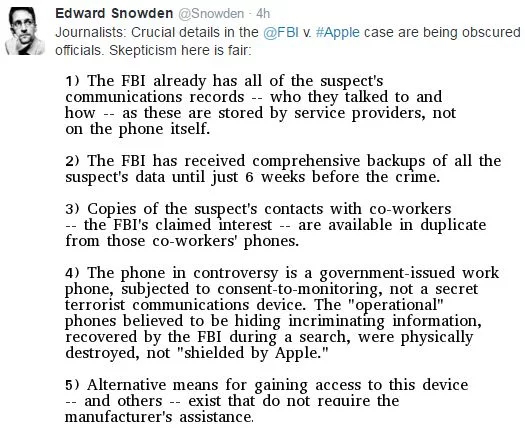The trench war over the San Bernardino shooters iPhone continues. The FBI demands that Apple should create a special OS to circumvent the “auto erase” function that, if activated, would make the phones contents unavailable after ten failed attempts to unlock it. And Apple is fighting the request.
However, it turns out that all of this might be unnecessary. There are other ways to access the content, as demonstrated by the ACLU.
It is unlikely that FBI didn’t know about this possibility — as it is a commonly used technique in the industry.
ACLU:s Technology Fellow Daniel Kahn Gillmor explains…
“All the FBI needs to do to avoid any irreversible auto erase is simple to copy that flash memory (which includes the Effaceable Storage) before it tries 10 passcode attempts. It can then re-try indefinitely, because it can restore the NAND flash memory from its backup copy.”
So, what is going on here?
“If this generally useful security feature is actually no threat to the FBI, why is it painting it in such a scary light that some commentators have even called it a “doomsday mechanism”? The FBI wants us to think that this case is about a single phone, used by a terrorist. But it’s a power grab: law enforcement has dozens of other cases where they would love to be able to compel software and hardware providers to build, provide, and vouch for deliberately weakened code. The FBI wants to weaken the ecosystem we all depend on for maintenance of our all-too-vulnerable devices. If they win, future software updates will present users with a troubling dilemma. When we’re asked to install a software update, we won’t know whether it was compelled by a government agency (foreign or domestic), or whether it truly represents the best engineering our chosen platform has to offer.”
Of course, it might just be about government incompetence. But never the less, the result would be the same: A judicial trojan horse for weakening device security all over the line.
Having seen what US government agencies have been up to — it is more likely than not that this is all about Big Brother deceptiveness.
• ACLU: One of the FBI’s Major Claims in the iPhone Case Is Fraudulent »
• Security Affairs: Snowden accuses the FBI of lying about his ability to unlock the iphone of the San Bernardino terrorist. “that’s horse sh*t.” he said. »
/ HAX
